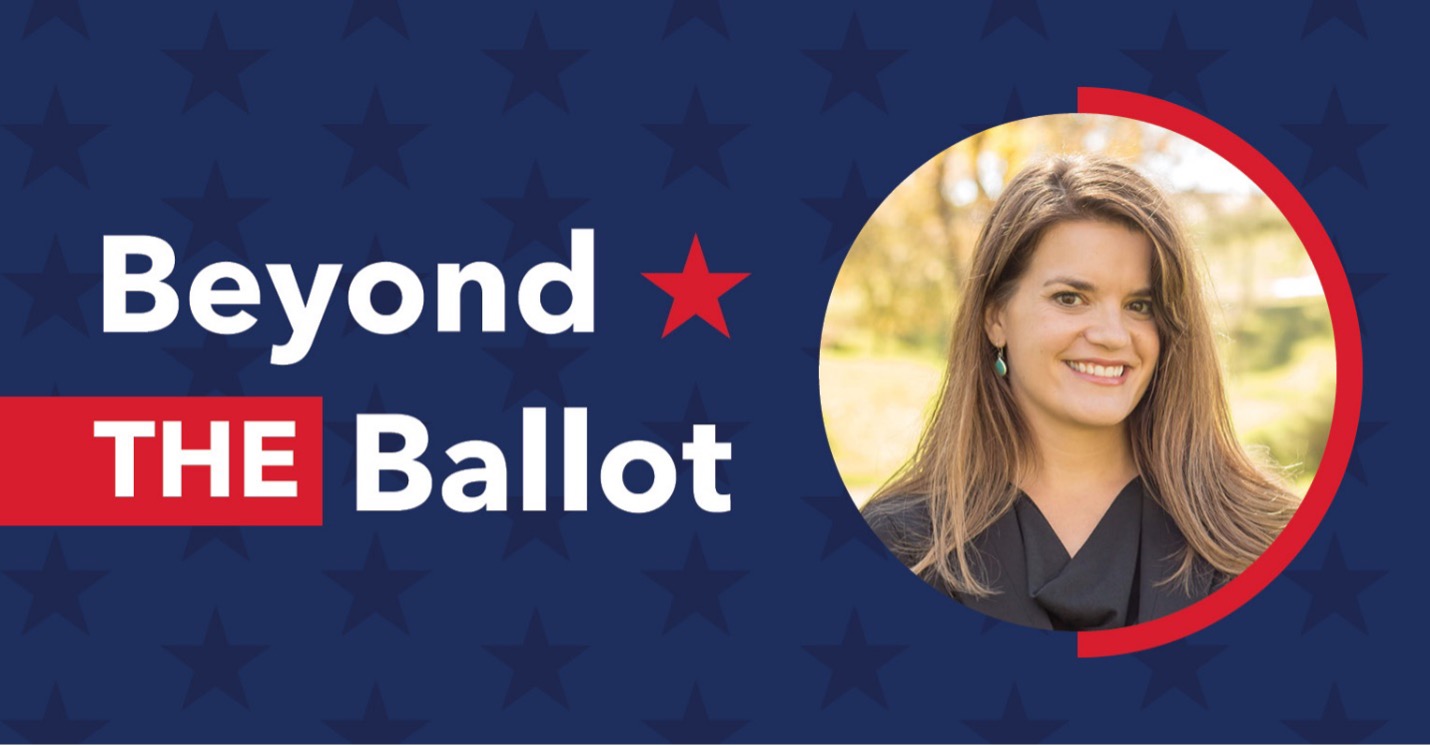By Morgan Thomas, Policy Associate
Growing up in Albuquerque, New Mexico, Secretary Maggie Toulouse Oliver always wanted to work in government. However, like most election officials, Secretary Toulouse Oliver didn’t grow up dreaming of one day becoming an election administrator. Her passion for elections grew as she gained more experience working on campaigns, voter education and outreach. Now having worked in elections for over two decades, Toulouse Oliver has leveraged her work experience to become the 26th Secretary of State of New Mexico.
Working through undergraduate and graduate school, Toulouse Oliver earned her bachelor’s and master’s degrees in political science from the University of New Mexico. Throughout college, she worked for U.S. Senator Jeff Bingaman in D.C., the county board for voter education and numerous volunteer positions involving elections. By 30, Toulouse Oliver had gained even more experience working as the State Director for the League of Conservation Voters in New Mexico. When the recession hit in 2008, the League of Conservation Voters closed many of its field offices across the country, leaving Toulouse Oliver without a job. While contemplating what to do next, the Bernalillo County clerk (New Mexico’s largest county) at the time became Secretary of State in New Mexico, creating a new vacant position. Reflecting on her experience in voter education, election logistics and voter outreach, she decided to go for it. “Well, I have spent the last 13 years registering voters and learning voting logistics. This office needs a lot of work, I’m young, I have the energy, why not throw my hat in the ring,” said Toulouse Oliver.
At only 30 years old, Toulouse Oliver was appointed by her county commissioner to serve as county clerk. In 2014, she ran for Secretary of State. Unfortunately, Toulouse Oliver lost the race by 3 points, but a new opportunity was on the horizon for her to run again. A few months after the election, then Secretary of State Dianna Duran was indicted for campaign finance fraud and had to resign from office. This sudden vacancy created a special election opportunity in which Toulouse Oliver was victorious.
Now in her new role as Secretary of State, she is the chief election official for the state of New Mexico. As such, she oversees state, federal and local elections. The Secretary of State’s Office is also responsible for applying the state election code, assisting overseas voters, overseeing campaign finance and lobbyist reporting, and providing a variety of business services. Aside from her duties as Secretary of State, Toulouse Oliver also serves in other leadership roles. She is the former president of the National Association of Secretaries of State, commonly known as NASS, and she currently serves as the co-chair of the elections committee. She also sits on the government coordinating council for Elections Infrastructure with the Cybersecurity and Infrastructure Security Agency (CISA) alongside Iowa Secretary of State, Paul Pate. In the midst of juggling these roles, she is also a student, working on her PhD in Political Science at the University of New Mexico.
With over 16 years of election experience, Toulouse Oliver has seen many changes in the administration of elections. When asked about positive changes over the years, she spoke about the modernization of elections as a whole. Namely the increased election security and how voting has advanced to meet the needs of voters. “The days of only voting from 7am to 7pm on one day in one polling location are gone, and there are now more opportunities for voters to cast their ballot,” said Toulouse Oliver. However, having a more automated process and technological advancements have proven rewarding and challenging. As election technology evolves, election security must evolve with it. While Toulouse Oliver believes elections have never been more secure, social media rhetoric has presented challenges. When asked about recent technological challenges, Toulouse Oliver stated, “Social media, for example, has been a double-edged sword. On one side, we have more tools at our disposal to get information out to voters. On the other side, it is so easy to spread and perpetuate misinformation and disinformation about elections and the election process.” The rise of misinformation and disinformation through social media has caused significant distrust in the government and elections across the country.
The increased security risks to election administrators are one of the biggest changes that Toulouse Oliver faces. “In recent years, personal security has not only become a top priority for our office, but for many election offices across the country,” she said. Election officials now must spend a significant amount of time trying to prove misinformation and disinformation wrong by providing correct and accurate information. This time-consuming and politically driven dilemma is causing many technically qualified election subject matter experts to leave, creating massive holes to fill.
Heightened public scrutiny over recent years has negatively affected both elections and election officials. As Secretary of State, Toulouse Oliver has taken action in response to help rebuild trust in the election system. One of the primary ways she has executed this is by emphasizing voter education. “I try to be proactive when tackling voter education by trying to get in front of a school setting when possible, having an active social media presence and civic organization engagement. We also created a rumor versus reality website modeled after CISA for Frequently Asked Questions to help address misinformation and disinformation,” she said. New Mexico also has many foreign language communities that Toulouse Oliver actively reaches out to. Since becoming Secretary of State, Toulouse Oliver started the Native American Voting Task Force to help better reach those communities.
Developing various programs to help with voter education and outreach has been rewarding but challenging. “Elections have been and continue to be one of the most underfunded aspects of government relative to their importance,” she said. Every state has faced a repeated challenge to receive consistent federal election funding. Developing programs within the confines of a budget is challenging, but according to Toulouse Oliver, “consistent federal funding is essential.” Nevertheless, she strives to create engaging programs that will increase voter turnout and provide greater trust in elections overall.
Conducting elections during a global pandemic was something that no current elected official had ever done before. One of the biggest takeaways Toulouse Oliver took from the 2020 election was the voter turnout amidst a global pandemic. “It was the largest election turnout in U.S. history, despite logistical issues and safety challenges. We got it done in the safest, most accurate and most secure way we’ve ever done. It’s kind of amazing.” She praises how, regardless of the politics surrounding the candidates and safety concerns around the elections themselves, election officials remained flexible and dedicated to helping voters cast their ballots accurately and efficiently. While that level of efficiency and security was partly due to federal regulations surrounding COVID-19, it was also largely due to technology. In New Mexico, online voter registration had existed pre-pandemic, but more voters took advantage of it during the pandemic. Online absentee ballot applications and voter information portals also saw an increase in traffic during the pandemic. Technology has proven to be an essential asset for voting following the 2020 election, and Toulouse Oliver is actively working to enhance existing tools to help improve voter turnout. She believes that enhancing existing technology and using as many secure online digital processes as possible will streamline the election process for election officials and improve voter turnout.
New Mexico’s Uniformed and Overseas Citizens Absentee Voting Act (UOCAVA) population is one that Toulouse Oliver mentions as a critical population that would benefit greatly from an enhanced digital process. “There are roughly a couple thousand registered UOCAVA voters in New Mexico. However, there are more UOCAVA-eligible voters than are registered. Additionally, a significant portion of those that are registered are still not participating in elections,” said Toulouse Oliver. While the Secretary believes that using hand-marked paper ballots is still the most secure form of voting, she acknowledges that by not having an electronic method they are losing a large number of votes. For this reason, she is actively working with CISA, the Overseas Voting Initiative, and other election technology-focused groups in hopes of finding accessible yet secure voting methods.


